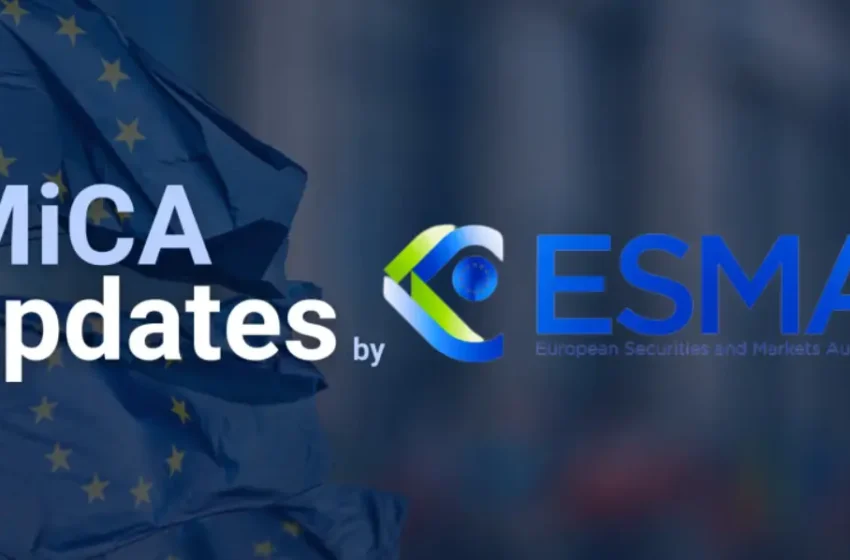XRP Transitions Into Institutional Settlement Asset Under Ripple’s XRPL Strategy
ESMA Introduces MiCA Guidelines to Ensure Crypto Staff Competency
(Originally posted on : Crypto News – iGaming.org )
Proposed guidelines have been introduced by the European Securities and Markets Authority (ESMA) to assess the credentials and experience of employees at crypto asset service providers. These suggestions are in line with the Markets in Crypto-Assets Regulation (MiCA) of the European Union, which seeks to create a transparent regulatory framework for the cryptocurrency sector.
ESMA’s consultation document, which was released on February 17, requests input from the sector on creating guidelines to guarantee that advisors on cryptocurrency assets are knowledgeable. Enhancing investor protection, standardizing industry procedures, and fostering confidence in cryptocurrency marketplaces are the goals.
Proposed Requirements for Crypto Professionals
The guidelines outline essential competencies for staff providing crypto-related advice and information. Employees must demonstrate an understanding of blockchain technology, crypto market operations, pricing mechanisms, and associated risks. Additionally, they need familiarity with relevant regulatory frameworks and tax implications.
The paper emphasizes the need for caution when advising on complex or highly volatile crypto assets. It also suggests establishing minimum qualifications, requiring staff to have relevant degrees, industry experience, and ongoing professional development.
Crypto firms must conduct annual assessments of their employees’ qualifications, supervise unqualified staff, maintain training records, and ensure continuous knowledge updates. These measures aim to enhance the reliability of crypto advisory services.
New players only. Exclusive Welcome Bonus of 350% + 150 Free Spins
ESMA is gathering feedback on its proposed rules and is open to alternative recommendations. The consultation period will run until April 22, with final guidelines expected in the third quarter of 2025.
As MiCA moves toward full implementation, regulatory efforts like this will shape the future of crypto services in the EU. The focus on education and professional standards could increase investor confidence and bring more structure to the rapidly evolving crypto industry.







 Bitcoin
Bitcoin  Ethereum
Ethereum  Tether
Tether  XRP
XRP  USDC
USDC  Solana
Solana  TRON
TRON  JUSD
JUSD  Dogecoin
Dogecoin  Lido Staked Ether
Lido Staked Ether  Figure Heloc
Figure Heloc  WhiteBIT Coin
WhiteBIT Coin  Bitcoin Cash
Bitcoin Cash  Cardano
Cardano  USDS
USDS  Hyperliquid
Hyperliquid  Wrapped stETH
Wrapped stETH  LEO Token
LEO Token  Canton
Canton  Wrapped Bitcoin
Wrapped Bitcoin  Ethena USDe
Ethena USDe  Binance Bridged USDT (BNB Smart Chain)
Binance Bridged USDT (BNB Smart Chain)  Chainlink
Chainlink  Monero
Monero  Stellar
Stellar  USD1
USD1  Wrapped eETH
Wrapped eETH  Dai
Dai  Litecoin
Litecoin  sUSDS
sUSDS  Avalanche
Avalanche  Zcash
Zcash  Sui
Sui  Coinbase Wrapped BTC
Coinbase Wrapped BTC  Hedera
Hedera  PayPal USD
PayPal USD  Shiba Inu
Shiba Inu  WETH
WETH  Toncoin
Toncoin  Rain
Rain  Cronos
Cronos  USDT0
USDT0  World Liberty Financial
World Liberty Financial  MemeCore
MemeCore  Tether Gold
Tether Gold  PAX Gold
PAX Gold  Polkadot
Polkadot  Uniswap
Uniswap  Mantle
Mantle  Ethena Staked USDe
Ethena Staked USDe  Bitget Token
Bitget Token  BlackRock USD Institutional Digital Liquidity Fund
BlackRock USD Institutional Digital Liquidity Fund  Falcon USD
Falcon USD  Aave
Aave  Pepe
Pepe  OKB
OKB  Circle USYC
Circle USYC  Bittensor
Bittensor  Global Dollar
Global Dollar  Ripple USD
Ripple USD  HTX DAO
HTX DAO  syrupUSDC
syrupUSDC  Sky
Sky  NEAR Protocol
NEAR Protocol  Internet Computer
Internet Computer  Ethereum Classic
Ethereum Classic  Aster
Aster  BFUSD
BFUSD  Pi Network
Pi Network  MYX Finance
MYX Finance  Pump.fun
Pump.fun  Ondo
Ondo  Worldcoin
Worldcoin  Gate
Gate  KuCoin
KuCoin  Ethena
Ethena  Jupiter Perpetuals Liquidity Provider Token
Jupiter Perpetuals Liquidity Provider Token  POL (ex-MATIC)
POL (ex-MATIC)  Cosmos Hub
Cosmos Hub  USDD
USDD  Quant
Quant  Superstate Short Duration U.S. Government Securities Fund (USTB)
Superstate Short Duration U.S. Government Securities Fund (USTB)  Jito Staked SOL
Jito Staked SOL  Midnight
Midnight  Algorand
Algorand  Aptos
Aptos  USDtb
USDtb  Binance-Peg WETH
Binance-Peg WETH  Rocket Pool ETH
Rocket Pool ETH  Official Trump
Official Trump  Binance Bridged USDC (BNB Smart Chain)
Binance Bridged USDC (BNB Smart Chain)  NEXO
NEXO  Filecoin
Filecoin  Wrapped BNB
Wrapped BNB